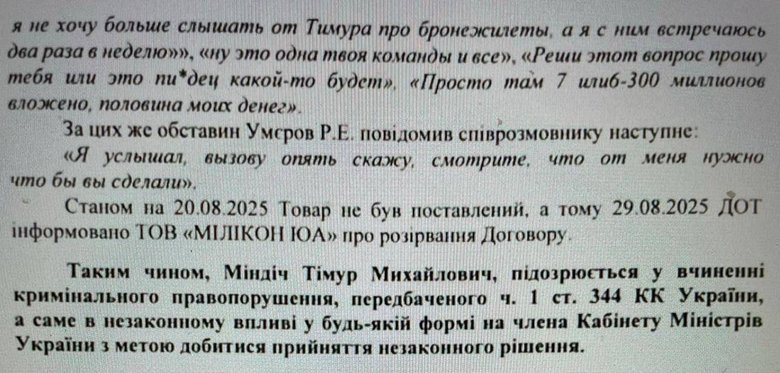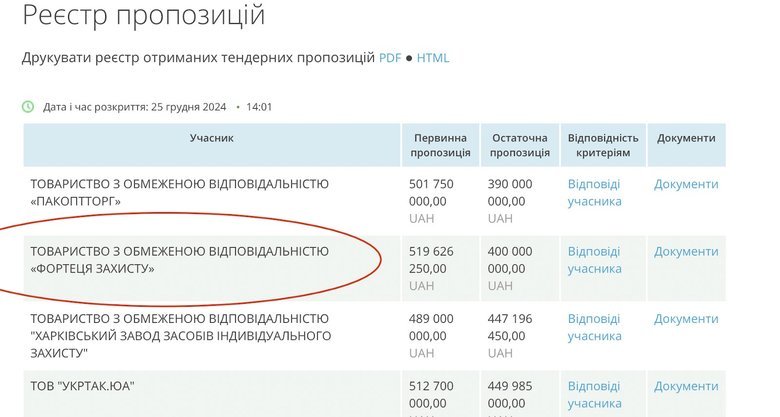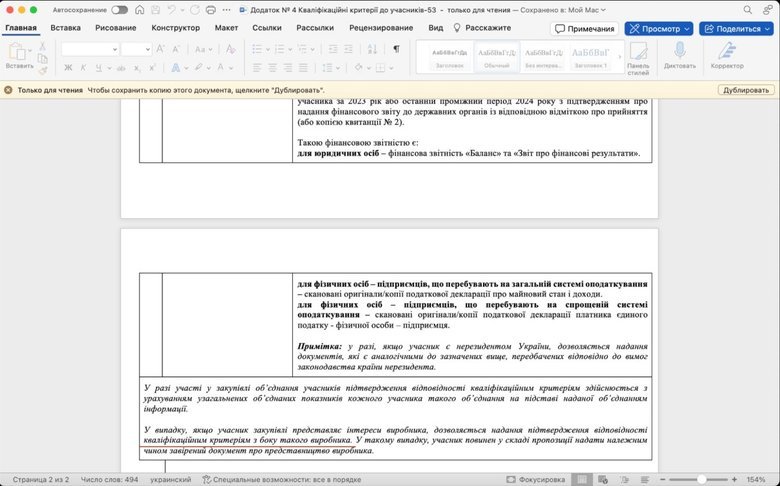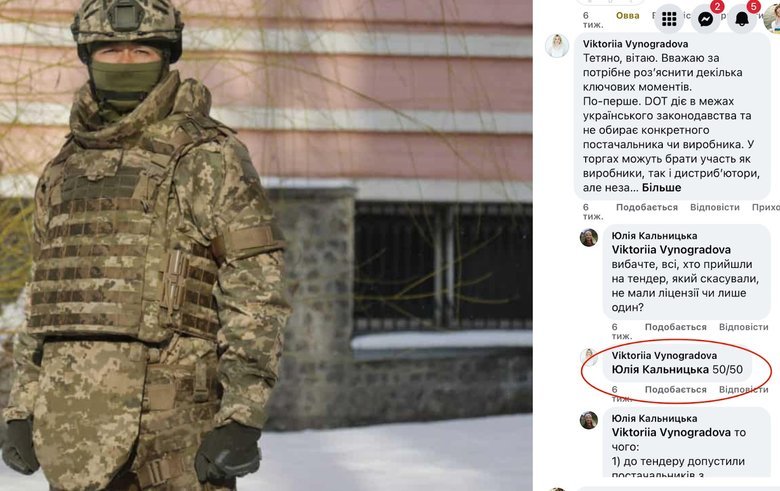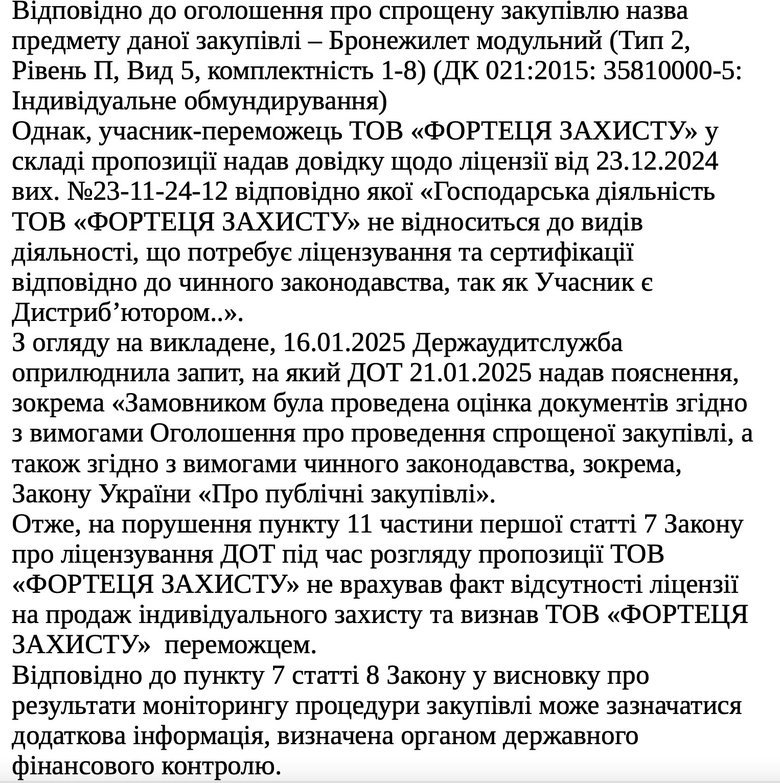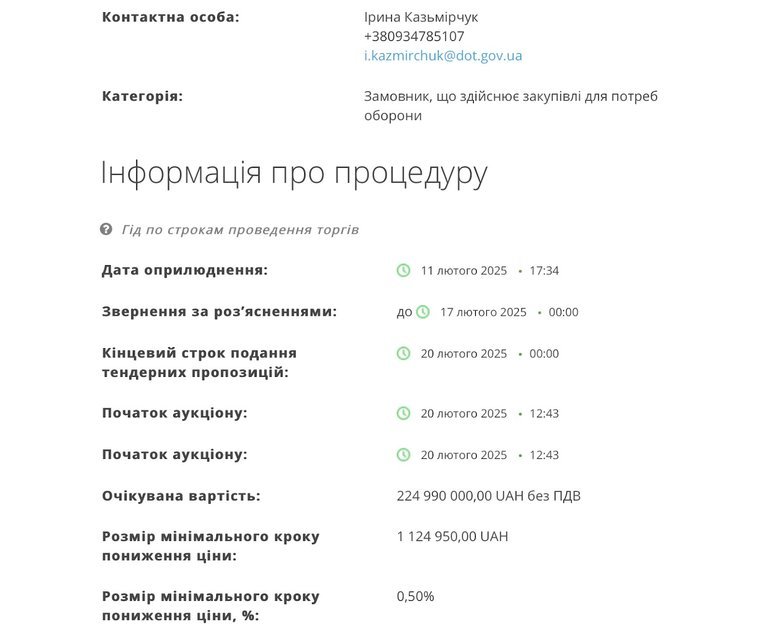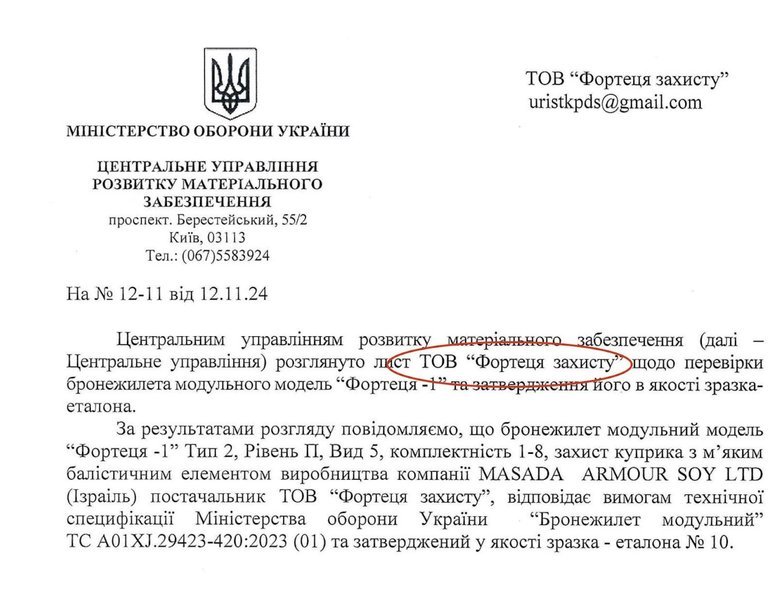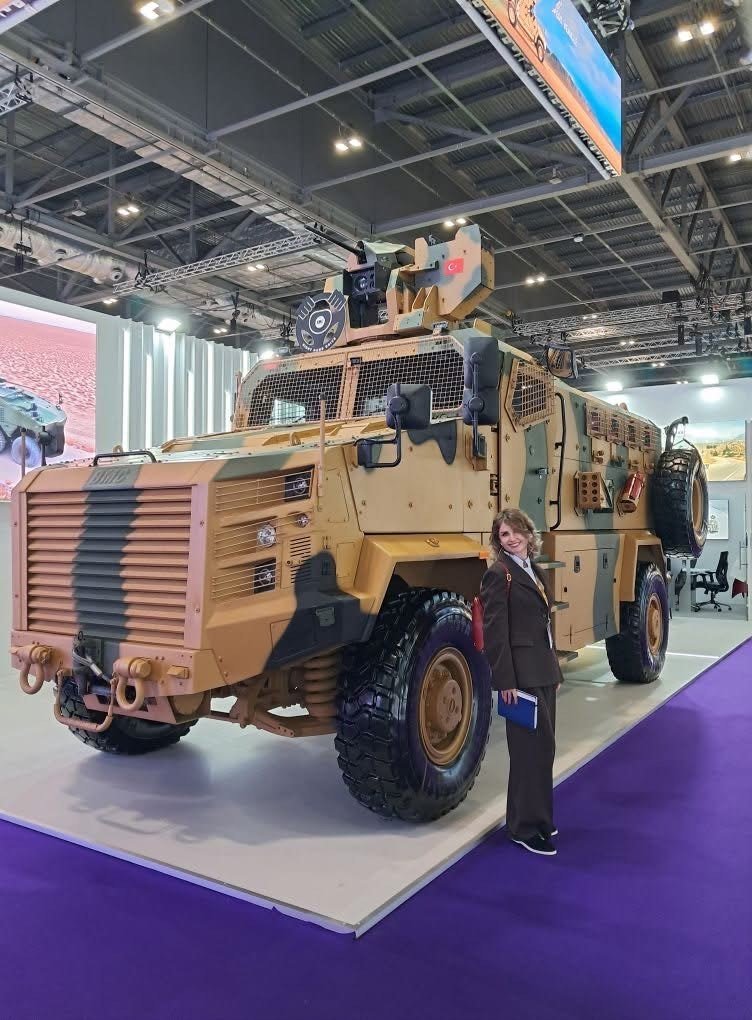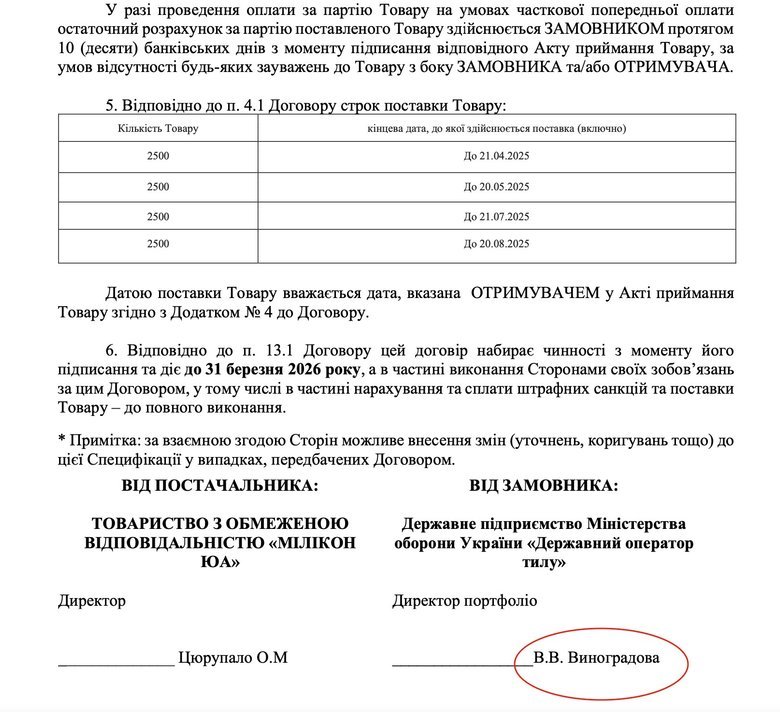How Umerov bought body armour from Mindich and what DOT had to break for that
This week, Prosecutor of the Specialised Anti-Corruption Prosecutor’s Office (SAPO) Serhii Savytskyi stated during a court hearing in a corruption case in the energy sector that the accused businessman Tymur Mindich allegedly had influence over then Energy Minister Herman Halushchenko and then Defence Minister Rustem Umerov.
Savytskyi maintains that the suspect, Mindich, "taking advantage of his friendly relations with the President of Ukraine and his connections with current and former officials, decided to unlawfully enrich himself by orchestrating crimes in various sectors of Ukraine’s economy."
"Over the course of 2025, facts of Mindich’s criminal activity were established in the energy sector by exerting influence on then Energy Minister Halushchenko, and in the defence sector by exerting influence on then Defence Minister Umerov," the SAPO prosecutor said.
Secretary of the National Security and Defence Council and former Defence Minister Rustem Umerov denied that anyone had influence over him in a post on his Telegram channel.
"Any attempts to link my work at the Ministry of Defence to the ‘influence’ of certain individuals are unfounded. As minister, I regularly met with manufacturers and suppliers of equipment and weapons, lobbyists and others. In particular, there was a meeting with Tymur Mindich at which the issue of body armour under a contract was raised. Ultimately, the contract was terminated because the products did not meet the requirements, and no items were delivered," Umerov wrote.
At the same time as Umerov’s statement, anonymous Telegram channels published part of the notice of suspicion issued to Mindich, which specifies which contract and which company are in question.
According to this excerpt, Mindich sought to lobby the minister to secure body armour supplies from a company called Milikon.
From the excerpt, it appears that Umerov was meeting with Mindich twice a week, with the latter pressuring him to push the procurement through. And Umerov agreed to call and apply pressure.
This procurement had already drawn criticism from members of the Public Anti-Corruption Council back in March. In particular, the corruption risks associated with it were highlighted in an article titled How DOT buys Israeli body armour through shell companies.
The procurement also became the subject of a study by the Independent Anti-Corruption Commission (NAKO), presented in June 2025, which contained a detailed analysis of the corruption risks in these tenders.
On 12 December, DOT announced a tender for almost 75,000 body armour vests. The total value of the lots was UAH 1.6 billion.
Alongside Ukrainian manufacturers – TEMP-3000, UKRTAK.UA LLC and KHZZIZ (Kharkiv Individual Protection Equipment Plant - ed.note), which have regularly taken part in tenders in recent years – the company Fortetsia Zakhystu also participated, and ultimately won.
In some of the lots, it offered the lowest price; in others, it did not.
Fortetsia Zakhystu was established in 2020. Its charter capital is UAH 500. Its main KVED (Classifier of Economic Activities) is non-specialised wholesale trade; the second KVED is providing moving and transport services.
In this tender, Fortetsia Zakhystu took part as a distributor of the Israeli company Masada Armor Soy, with which it signed a contract on 9 October 2024.
For the procurement of body armour in 2024, DOT established only two qualification criteria:
- Documented experience in executing a contract (s) similar to the subject of procurement.
- Financial solvency, confirmed by financial statements.
These are the exact formulations used in the tender announced on 24 October 2024.
However, in December, when Fortetsia Zakhystu entered the tender, the qualification criteria were amended to allow documents demonstrating compliance to be submitted not by the supplier, but by the manufacturer (whose products were to be delivered).
In effect, the qualification criteria were broadened to suit a single company, which is what enabled it to enter the tender.
As a financial guarantee, Fortetsia Zakhystu submitted the financial documents of Masada Armor Soy, and for its own track record, it relied on the Israeli company’s experience on the Israeli market.
According to clause 8 of Annex No. 1, a bidder was required to include in its tender offer a copy of the licence or the order granting a licence for the production of personal protective equipment (PPE).
Fortetsia Zakhystu failed to do so and therefore could not lawfully be recognised as the winner. Ukrainian companies, however, did have such documents. Instead of moving on to the next candidates, DOT cancelled the tender altogether.
It should be recalled that the State Operator for Non-Lethal Acquisition (DOT) conducts defence procurement pursuant to the Law of Ukraine On Public Procurement and Cabinet of Ministers Resolution No. 1275. Part 17 of Article 14 of the Law of Ukraine On Public Procurement sets out the grounds on which a contracting authority cancels a simplified procurement, in particular:
-
the absence of any further need to procure the goods, works or services;
-
the impossibility of remedying violations arising from breaches of public procurement legislation that have been identified;
-
a reduction in expenditure on the procurement of goods, works or services.
None of these grounds applied in the case of the procurement in question.
In response to a request from Censor.NET, DOT stated:
"Since foreign manufacturers took part in the tender for the first time, the State Operator for Non-Lethal Acquisition (DOT) requested clarifications from the Ministry of Internal Affairs (MIA), as the licensing authority for personal protective equipment (PPE), regarding licensing requirements.
According to these clarifications, a manufacturer that holds a licence to produce PPE must also hold a licence to sell it.
At the same time, a distributor selling in Ukraine products of a non-resident that holds a manufacturing licence in its own country is required to obtain a licence to sell those goods in Ukraine."
Later, Viktoriia Vynohradova, head of a DOT unit, joined a debate in the comments under a Facebook post by Tetiana Nikolaienko and acknowledged that the other bidders did have licences.
Under these circumstances, there is reason to suspect that DOT was interested in securing the victory of a specific supplier, which entails significant corruption risks, given that the company was competing for tenders worth UAH 1.6 billion.
The cancellation of the tender took place after DOT had already recognised Fortetsia Zakhystu as the winner in the first lot, without a licence, and signed a contract. That contract was cancelled only after KHARKIV INDIVIDUAL PROTECTION EQUIPMENT PLANT LLC lodged a complaint with the State Audit Service. In its conclusion, the State Audit Service stated that, in breach of paragraph 11 of part one of Article 7 of the Law on Licensing, DOT failed to take into account the absence of a licence to sell personal protective equipment when reviewing the bid of FORTETSIA ZAKHYSTU LLC and, nonetheless, declared FORTETSIA ZAKHYSTU LLC the winner.
Following this tender, on 16 January, DOT contracted 55,000 sets of body armour from TEMP at a price of UAH 22,699 per set. The company was to deliver the body armour by October 2025.
In February, however, DOT announced a new tender for modular body armour (Type 2, Protection Level P, Category 5, configuration 1–5) (CPV 021:2015: 35810000-5: Individual equipment). The expected value of the tender was UAH 224.9 million, for 10,000 body armour vests.
Alongside regular bidders TEMP-3000 and Ukrtak, a newcomer, MILIKON UA LLC, took part in the tender.
The company was established in August 2022. The size of its charter capital is 160,000 hryvnias. Its main KVED is non-specialised wholesale trade. Its second KVED is weapons manufacturing.
The company had not participated in state tenders before, nor had Fortetsia Zakhystu.
At the same time, MILIKON UA LLC has the same ultimate owners as Fortetsia Zakhystu. In fact, the structure is as follows: 49% of Milikon is owned by Fortetsia Zakhystu, and the remaining 51% by Dmytro Stetsenko, who is also the owner of Fortetsia Zakhystu.
The ownership structure of the company was changed one day before the deadline for submitting documents for the body armour tender.
Data on changes in the ownership of MILIKON UA LLC from Opendatabot:
Data on the tender time from the Prozorro system:
Like Fortetsia Zakhystu, MILIKON UA LLC acts as a distributor for the Israeli company Masada Armor Soy. The documents with the Israeli company were signed three days before the start of the tender, which is indicative of sham activity by a company set up specifically for this procurement.
MILIKON UA LLC won the tender.
In these circumstances, the actions of the state-owned enterprise DOT can be viewed as a failure to properly vet bidders and as giving preferential treatment to a particular bidder by deliberately ignoring grounds for excluding it from the procurement procedure.
On 27 February, DOT signed a contract for the supply of body armour with MILIKON UA LLC for a total amount of UAH 217 million
At the same time, as stated in a complaint filed by Temp 3000, "the bidder MILIKON UA LLC did not provide a document issued by the Central Directorate for Logistics Development of the Armed Forces of Ukraine in the name of MILIKON UA LLC for the body armour it offered, but instead uploaded a document issued to another legal entity – Fortetsia Zakhystu LLC. The documents submitted contain no confirmation whatsoever of any association, consortium or other form of joint activity between Fortetsia Zakhystu LLC, which was issued letter No. 12-11 of 12.11.24 approving the reference sample of the modular body armour model ‘Fortetsia-1’, Type 2, Protection Level P, Category 5, configurations 1–8, manufactured by MASADA ARMOUR SOY LTD, and MILIKON UA LLC."
The facts set out above indicate that representatives of DOT failed to take note of the fact that the company’s operations bore the hallmarks of sham activity, which could ultimately result in non-delivery of the goods.
As with the previous tender involving Fortetsia Zakhystu LLC, this procurement became the subject of monitoring by the State Audit Service.
The monitoring found that, under clause 2 of Annex 3 to the procurement notice, in order to confirm that the goods offered met the technical, qualitative and quantitative characteristics of the subject of the procurement, a bidder was required to upload, as part of its bid, a copy of a document issued by the Central Directorate for Logistics Development of the Armed Forces of Ukraine (or another authorised military command body where the technical documentation was not developed by the Ministry of Defence of Ukraine) certifying that the goods offered for delivery complied with the Ministry of Defence’s technical documentation (the relevant technical documentation is listed in Annex No. 3 to the notice).
The bid submitted by MILIKON UA LLC included a letter from the Central Directorate for Logistics Development of the Ministry of Defence of Ukraine dated 30.11.2024, No. 220/61/2314 (file "AKT TSURMZ ZAVIRENYI.pdf"), issued to the supplier FORTETSIA ZAKHYSTU LLC in response to its request to have the modular body armour model Fortetsia-1 tested and approve it as a reference sample. At the same time, the requirements of the notice did not provide for such documents to be submitted by other business entities. The State Audit Service, therefore, used the electronic procurement system to request that DOT explain how MILIKON UA LLC had complied with clause 2 of Annex 3 to the notice.
On 17.03.2025, DOT provided an explanation stating that "... MILIKON UA LLC submitted a document confirming that it is a representative of the manufacturer (file ‘Letter from MASADA – MILIKON UA REPRESENTATIVE.pdf’). MILIKON UA LLC also indicated in its price offer that the manufacturer of the goods offered was Masada Armour Soy Ltd. (file ‘Annex No. 2 Price Offer Form MILIKON 10k.pdf’).
Since the manufacturer of the goods offered is Masada Armour Soy Ltd., MILIKON UA LLC submitted a letter from the Central Directorate for Logistics Development No. 220/61/2314 of 30.11.2024 (file "LETTER TSURMZ ETALON 804-0000000000-20241130-000220--61--2314-1-00.pdf"), stating that the modular body armour model Fortetsia-1, Type 2, Protection Level P, Category 5, configurations 1–8, produced by MASADA ARMOUR SOY LTD, complies with the Ministry of Defence of Ukraine’s technical specification ‘Modular body armour’ TS A01XJ.29423-420:2023 (01). We note that, according to clause 2 of Annex No. 3 to the notice of simplified procurement, there is no requirement that the document be issued at the request of (in the name of the legal entity of) the bidder."
The explanation provided by DOT does not remedy the breach and contradicts the requirements laid down in the notice.
Whereas, the bid submitted by MILIKON UA LLC contained no document confirming that it was this company that had applied to the Central Directorate and obtained from it the relevant document certifying that the goods offered for delivery complied with the Ministry of Defence of Ukraine’s technical documentation (the relevant documentation is listed in ANNEX No. 3 to the notice).
Moreover, under clause 8 of Annex 1 to the notice, if a bidder is not the manufacturer of the products or offers products made by other manufacturers, it must provide scanned copies of documents confirming its relationship with the manufacturer or with the manufacturer’s dealer/distributor/representative, etc. The bid submitted by MILIKON UA LLC contained no document whatsoever confirming any relationship/cooperation with FORTETSIA ZAKHYSTU LLC.
The state-owned enterprise DOT challenged this conclusion by the State Audit Service in court but lost. On 1 July, the enterprise lodged an appeal, which has since stalled.
The same is true of the performance of the contract. Under its terms, the company was to deliver the body armour in four batches: by 21.04.2025, by 20.05.2025, by 21.07.2025 and by 20.08.2025.
During this period, not a single body armour vest was accepted. After the first delivery, which was made late, it emerged that the body armour did not meet the technical specifications.
At the same time, DOT did not terminate the contract until the very last day of the delivery period and, as noted above, fought for it in court.
The situation with the body armour was discussed at a meeting of the Ministry of Defence’s Collegiate Body, where it was made clear that the vests would not be accepted not only because they had "Chinese plates", but also because they were "sloppily stitched".
The contract was terminated on 29 August, after the change of defence minister and once the relevant area of work had passed from Viktoriia Vynohradova to Mykyta Chychkan.
In July, Vynohradova took up a position at the DPA.
DOT still insists that it committed no violations when concluding this contract – and even points out that it reduced the price.
However, the analysis carried out indicates the opposite.
Moreover, through its actions, DOT effectively undermined the development of Ukrainian body armour production.
All of this could perhaps be explained away as a strange coincidence were it not for the published excerpt from Mindich’s notice of suspicion containing quotations from Umerov.
Conclusion: Fortetsia Zakhystu and Milikon could not have taken part in the tender under the criteria in force in 2024. DOT deliberately expanded the qualification criteria so that these companies could enter the competition.
DOT declared Fortetsia Zakhystu the winner even though it did not have the requisite documents, and then cancelled the tender altogether, in which it could have recognised the next company as the winner.
DOT twice ignored the State Audit Service’s findings in favour of these companies, even though those findings pointed out that they lacked the necessary documents to be declared winners, and even challenged the State Audit Service’s conclusion in court.
This entire scheme took place while the ministry was headed by Rustem Umerov and began when DOT was still headed by Arsen Zhumadilov.
The person responsible for these contracts (Viktoriia Vynohradova) was promoted and moved to the DPA.
The only reason the money was not paid out was that the military refused to accept the body armour.
In the published part of the notice of suspicion served on Mindich, it is clear that Umerov knew these were his companies, that the businessman had invested his own money in them, and that he was exerting influence on DOT regarding this matter.
Tetiana Nikolaienko, Censor.NET


